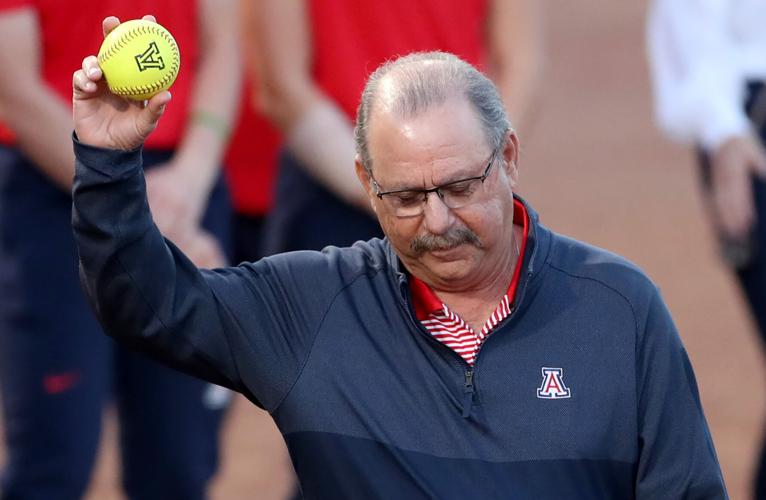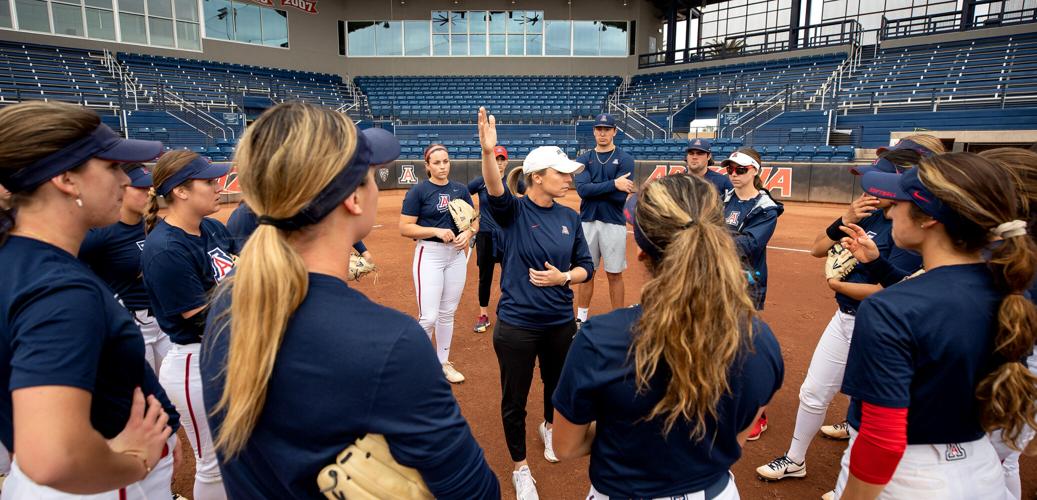Ever since Mike Candrea touched down in Oklahoma City for the Women’s College Series, he’s been peppered with the same question: "How does it feel to be there as a spectator rather than a coach?"
"I’ve answered that question about 50 times," said Candrea, who led the Wildcats to 24 Women’s College World Series appearances in 34 seasons before retiring last summer.
“But I’m excited to be here and support this team. I think they’ve had a tremendous run. I just want to be here to share Caitlin’s first appearance as a head coach. This team and the body of work it took to get here, I think is just phenomenal. It’s different, that’s for sure. Now I’m sitting here just watching the rain. That part hasn’t changed.”
Candrea coached first-year boss Caitlin Lowe and current pitching coach Taryn Mowatt-McKinney to Arizona’s last national championship in 2007. Last week, he was announced as one of eight additions to the UA Sports Hall of Fame, along with former Arizona softball star Brittany Lastrapes and Fred Batiste, who became the first Black athlete at the UA in 1949, among others.
Candrea joined ESPN Tucson’s "Spears and Ali" to talk about Arizona’s run, the coolness of Lowe, and joining the newest class of the UA Sports Hall of Fame.
Arizona began Pac-12 play 0-8, then snuck in the postseason, but the Wildcats have obviously hit another gear since then. What’s changed from your perspective?
A: “Nothing really changed. I think that’s one of the good things. (Lowe) stuck to her process very well, the culture was really good and it was just a matter of time that a young team will have to grow up and mature and find their confidence. It took a while for that to happen, but as you saw so far this postseason, they’re playing very good softball, people have stepped up, this team is playing like a team and they’re hot at the right time — and that’s all you can ever ask for. (That) at the end of the year, you’re playing your best softball when it counts, and I think that’s what they did.”
Does this season’s UA team remind you of any you’ve coached at Arizona?
A: “I never want to compare other teams, but it does kind of remind me of 1991, when we won our first championship, because it was unexpected. We were a team of blue-collar workers and there weren’t any superstars on the team, but we got in here and just got on a roll when we took the field, and I think this team has a level of confidence they’re playing with. I’ve never seen them hit the panic button. They’ve been emotionally stable over the last couple weeks, and they’re feeding off each other and not worrying about themselves. They’re playing team softball and when you can do that, it’s a lovely thing to watch, because they’re doing all the little things right. … I’ve always said, ‘Defense, pitching, timely hitting.’ That has never really changed throughout all the years that I’ve been coaching.”

Caitlin Lowe, center, has put an emphasis on player development in her first season as the Wildcats' head softball coach, former boss Mike Candrea says.
Even though you’re not the head coach anymore, you have an advisory role in the UA athletic department. What has your communication with Lowe been like in her first season?
A: “I really try to give her space. I have an office right down from where they’re at — where my old office was. I wanted her to know that I was there, if need be, and we’ve had some casual conversations, but truthfully, the stamp on this team is Caitlin’s. She’s the reason why I urged (athletic director) Dave (Heeke) to hire her, because I thought she’d be who she is right now. She’s a good leader, she understands the game and I think she’s put together a staff that works well together. She’s been in games, so she knows what it’s like to be on that field and when your motor is going 100 miles per hour and you got to slow it down. She also relates well in high-powered situations.
“The big thing: She understands development. It’s something that you can’t rush and it takes time. If there’s one attribute that I think she has that’s really paid off this year is patience and her calmness. Caitlin spends a lot of time in preparation, so I knew this team would always be well-prepared. Her demeanor and calmness have influenced this team during tough times. … One thing that really helps our program is tradition, and when you come to Arizona, there’s the expectation we have. The athletes we bring in are the ones who want that. They want to play in the big game and be at the College World Series. The athletes we have are good. Even though we have a lot of new faces, they were able to enjoy the experience here and that paid off. That paid dividends when we went to Arkansas last year and had to beat a hot team on the road. That database you collect as a player helps you in the future, and I think that’s part of this team’s success.”
What’s your reaction to being one of eight newest members of the UA Sports Hall of Fame?
A: “It’s fabulous. When you start coaching, you don’t think about any of these things happening. I’ve been blessed to do something I love to do. I followed my passion, and I didn’t work a single day in my life. I’ve been able to surround myself with great people. It takes a village for all of this to happen. None of us can do this by ourselves. When you get those honors, it’s really a celebration of the body of work that many people have done. … Every honor that I get is shared with every player and every assistant coach that I’ve had — and every support staff that I’ve had. That’s what makes a winning environment. It takes a lot of people. It really comes down to how you treat people. One thing I always worked hard at was treating people right and making them feel valuable. Even the guys who work on our field, there wasn’t a day that went by where I didn’t thank them for their hard work. When you do that and make people feel invested in something, good things happen. My job at the end of the day was to build this boat, put the people on the boat and keep the boat in the right line through rough seas and get out of it safely. Hopefully, that’s what I’ve done.”







